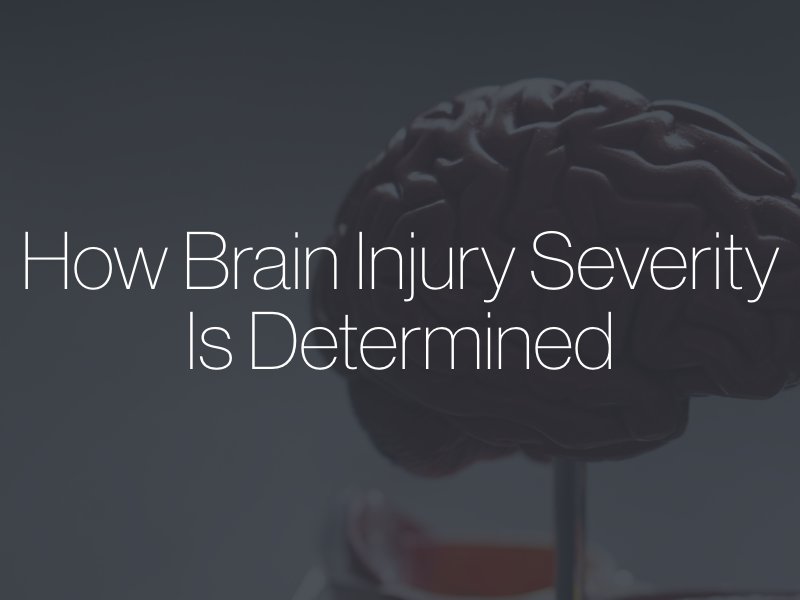Brain injuries occur in a wide variety of ways, and they can range in levels of severity. Determining the severity of a brain injury is important to obtaining maximum compensation for our San Francisco brain injury clients.

The Glasgow Coma Score and Brain Injury Severity
The historical tool for determining brain injury severity is the Glasgow Coma Scale (GCS). The GCS was developed in 1974 and is used by emergency medical professionals, nurses, doctors, and first responders to evaluate the acute severity of brain injuries. Health care providers use the GCS relying on three categories and a point system:
1. Eye-opening
- Eyes open spontaneously – 4 points
- Eyes open to verbal stimuli – 3 points
- Eyes open in response to painful stimuli – 2 points
- No response or eyes remain closed – 1 point
2. Speech
- The person is alert and oriented – 5 points
- The person may be confused but able to answer questions – 4 points
- The affected individual uses inappropriate words for the situation – 3 points
- Speech is incomprehensible – 2 points
- No response – 1 point
3. Movement
- An individual can move parts of the body on command – 6 points
- A person exhibits purposeful movement in response to painful stimuli – 5 points
- Individual withdraws from pain – 4 points
- The person’s body parts draw inward in response to pain – 3 points
- Body parts move outward in response to pain – 2 points
- No response to pain – 0 points
The GCS score for an individual is the sum of their scores for each category. For example, a person who opens their eyes when a healthcare provider says their name will receive three points for opening their eyes. However, if they answer questions in an incomprehensible manner, they would receive two or less points for speech.
In general, a GCS of 13 and above is thought to indicate a mild traumatic brain injury. It is not uncommon for individuals who sustain concussions to receive a GCS score of 13 or above. If an individual scores in the range from 9 to 12 on the GCS they will have sustained a moderate traumatic brain injury.
Individuals with a GCS score of eight or below will likely have experienced a severe traumatic brain injury. These symptoms are usually obvious, including long periods of unconsciousness, trouble with speech, mobility issues, and more.
SOPHISTICATED TESTING BEYOND THE GCS NOW EXISTS TO HELP CATEGORIZE AND TREAT TBI
In 2015 an article in the British Journal of Radiology ( J Radiol. August 2015; 88(1052) ) discussed at length the usefulness of 3.0-T MRI to detect severe traumatic brain injury and predict the outcome. The authors, Yuan, Wei, Jin et. al. concluded that such studies were better at shoeing TBI-caused brain lesions than CT scanning. In addition, they opined that MRI evaluation of this type better showed the size of bleeds and diffuse axonal injury. Patients with poor prognoses and outcomes showed a higher volume of hemorrhage.
In 2021 Doctors at the University of Utah and the University of California San Francisco published an article entitled “Emerging Utility of Applied Magnetic Resonance Imaging in the Management of Traumatic Brain Injury”. In that article Doctors Nadel, McNally, DiGiorgio, and Grandhi wrote that while the standard diagnostic workup for new TBI includes obtaining a non-contrast CT image of the head, they believed that magnetic resonance imaging (MRI) is a better tool for ongoing management and prognosis after TBI. The authors listed functional MRI’s, diffusion tensor imaging, MR perfusion, and MR spectroscopy as modern tools to help identify the severity of the injury and how each of these studies can be utilized to improve the care of TBI patients
In addition to MRI studies, a neuropsychological assessment can help confirm the injury and its location in the brain. A correctly performed neuropsychological study consists of multiple different tests administered and interpreted by a skilled professional. A neuropsychologist is a psychologist with a Ph.D. or Psy.D. credential who conducts the evaluation.
A lengthy interview with the patient typically precedes the testing sessions. Interviews of family members may also be utilized depending on their availability and the severity of the brain injury. A review of related medical and hospital records to correlate findings is also standard.
Unlike an MRI or CT, this type of testing is more subjective, seeking to evaluate such things as attention span, short and long-term memory, concentration, language, new learning, abstract thinking, and problem-solving. The examination may also evaluate judgment, emotional function, and psychological adjustment.. A rehabilitation plan for the patient may be based will on the exam and test results.


